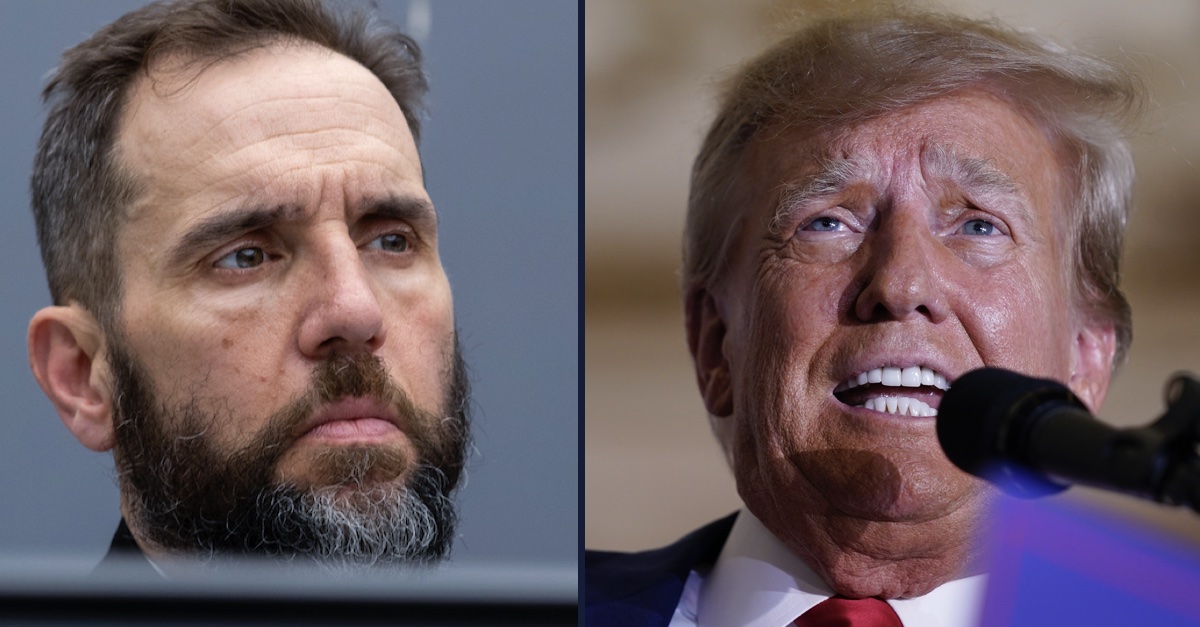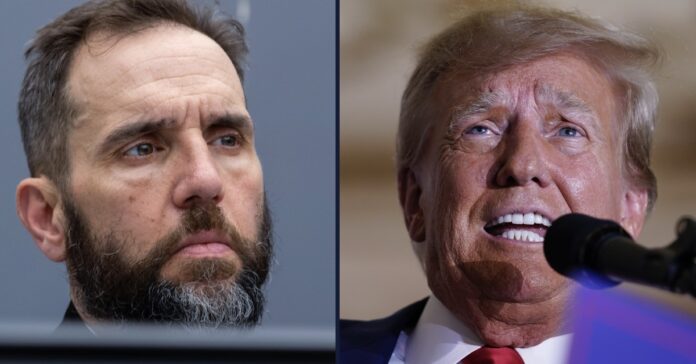
Jack Smith (AP Photo/Peter Dejong, Pool), Donald Trump (AP Photo/Evan Vucci, File)
The Special Counsel’s Office asked the judge presiding over former President Donald Trump’s Mar-a-Lago classified documents retention and obstruction prosecution to order up written juror questionnaires ahead of jury selection to root out “potential bias” and “winnow” the pool ahead of time.
In support of his argument, Jack Smith pointed to the way the courts handled pre-trial publicity in the cases of Boston Bomber Dzhokhar Tsarnaev and Enron CEO Jeffrey Skilling.
While acknowledging U.S. District Judge Aileen Cannon’s recent order that additional deadlines would be considered at a March 1 scheduling conference, the special counsel asserted the jury questionnaires are “necessary” and that the time it will take to create, mail, and sift through the responses of potential jurors should move the judge to set a Feb. 2 deadline for prosecutors and the defense to “submit a joint proposed jury questionnaire.”
“As described below, previous cases in this District in which questionnaires were used suggest that the Clerk’s Office requires approximately ten weeks’ time for the questionnaire process, which includes mailing questionnaires to potential jurors to be returned to the Clerk’s Office in post-marked envelopes,” Smith said. “In this case, that means that a final questionnaire would need to be approved before on or about March 11 for a May 20 trial.”
If Judge Cannon prefers, the special counsel added, she can summon potential jurors to fill out the questionnaires at the courthouse, but even that “would require some additional notice to the Clerk’s Office, as summonses would have to be issued earlier than they would be for jurors to appear for the first time on May 20.”
Then Smith referred to the Tsarnaev and Skilling cases as “instructive” on the jury questionnaires issue, since the Supreme Court “viewed their use favorably in affirming the voir dire process in those highly-publicized cases”:
In Tsarnaev, where the defendant was charged with the Boston Marathon bombings, “[i]n preparation for jury selection, the parties jointly proposed a 100-question form to screen the prospective jurors.” Tsarnaev, 595 U.S. at 308. “The District Court summoned an expanded jury pool of 1,373 prospective jurors and used the 100-question juror form to cull that down to 256. The questionnaire asked prospective jurors what media sources they followed, how much they consumed, whether they had ever commented on the bombings in letters, calls, or online posts, and, most pointedly, whether any of that information had caused the prospective juror to form an opinion about Dzhokhar [Tsarnaev]’s guilt or punishment.” Id. at 314.
In Skilling, in which a former Enron executive was charged with fraud, the district court used a 77-question, 14-page questionnaire. The questionnaire “asked prospective jurors about, inter alia, their sources of news and exposure to Enron-related publicity, beliefs concerning Enron and what caused its collapse, opinions regarding the defendants and their possible guilt or innocence, and relationships to the company and to anyone affected by its demise.” 561 U.S. at 371. The court then mailed the questionnaire to 400 prospective jurors and received responses from nearly all of them. Id. at 372. It granted hardship exemptions to about 90 individuals, and with the court’s approval, the parties further winnowed the pool by excusing another 119 for cause, hardship, or physical disability.
Smith, noting that defense has opposed the motion for a jury questionnaire to probe biases as “premature,” said that the written questionnaire approach is “a necessary step” that should be taken sooner rather than later so there is enough time to complete the process before jury selection.
“Given the media coverage this case has received, a written questionnaire that probes exposure and potential bias is a necessary step in the jury selection process. It will make the jury selection process more efficient and aid the Court and the parties in identifying potential bias in the jury venire,” the motion said.
Therefore, the special counsel asked the judge to set the February deadline for the prosecution and defense to “jointly submit a proposed jury questionnaire identifying areas of disagreement.”
From the motion:
The Government proposes that the parties confer on potential questions and submit to the Court a joint questionnaire identifying areas of disagreement sufficiently in advance of the date on which it must be finalized, so that the Court can approve a final version, including holding a hearing if necessary. Potential jurors should then complete questionnaires sufficiently in advance of in-person voir dire so that the parties and Court can winnow the venire, as occurred in the cases cited above, and prepare to conduct thorough and informed in-person questioning.
Read the motion here.
Have a tip we should know? [email protected]

